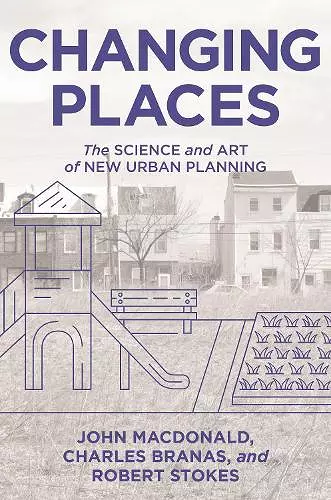Changing Places
The Science and Art of New Urban Planning
Robert Stokes author John Macdonald author Charles Branas author
Format:Paperback
Publisher:Princeton University Press
Published:2nd Aug '22
Currently unavailable, and unfortunately no date known when it will be back
This paperback is available in another edition too:
- Hardback£35.00(9780691195216)

How the science of urban planning can make our cities healthier, safer, and more livable
The design of every aspect of the urban landscape—from streets and sidewalks to green spaces, mass transit, and housing—fundamentally influences the health and safety of the communities who live there. It can affect people's stress levels and determine whether they walk or drive, the quality of the air they breathe, and how free they are from crime. Changing Places provides a compelling look at the new science and art of urban planning, showing how scientists, planners, and citizens can work together to reshape city life in measurably positive ways.
Drawing on the latest research in city planning, economics, criminology, public health, and other fields, Changing Places demonstrates how well-designed changes to place can significantly improve the well-being of large groups of people. The book argues that there is a disconnect between those who implement place-based changes, such as planners and developers, and the urban scientists who are now able to rigorously evaluate these changes through testing and experimentation. This compelling book covers a broad range of structural interventions, such as building and housing, land and open space, transportation and street environments, and entertainment and recreation centers.
Science shows we can enhance people's health and safety by changing neighborhoods block-by-block. Changing Places explains why planners and developers need to recognize the value of scientific testing, and why scientists need to embrace the indispensable know-how of planners and developers. This book reveals how these professionals, working together and with urban residents, can create place-based interventions that are simple, affordable, and scalable to entire cities.
"Winner of the James Short Senior Scholar Award, Communities and Place Division of the American Society of Criminology"
"A great, bracing read for us cultural theorists: the authors really interrogate what evidence means in a complex ecosystem such as a city, as well as what you do with it. The case studies in the rest of the book show off examples of evidence-led interventions, all with apparently proven social benefits: they include large-scale tree planting for health in Philadelphia, light rail ridership fighting obesity in Charlotte and the use of signs in LA parks to make people exercise. The message is a simple one: with the right evidence base, you can make meaningful changes. Like London’s cholera in 1854, you can cure a city of its social ills."---Richard J. Williams, Times Higher Education
ISBN: 9780691234434
Dimensions: unknown
Weight: unknown
210 pages